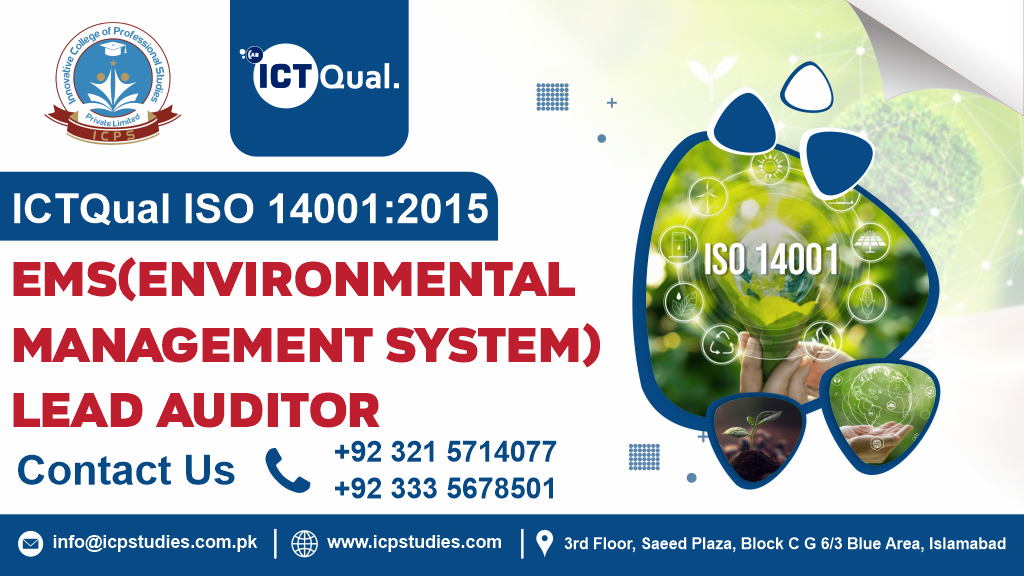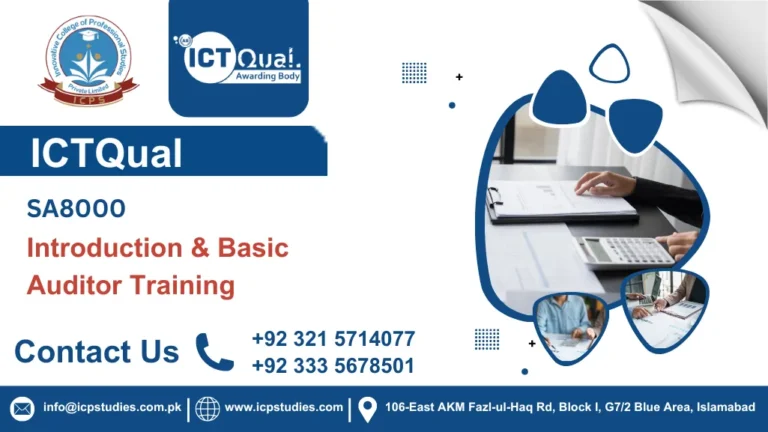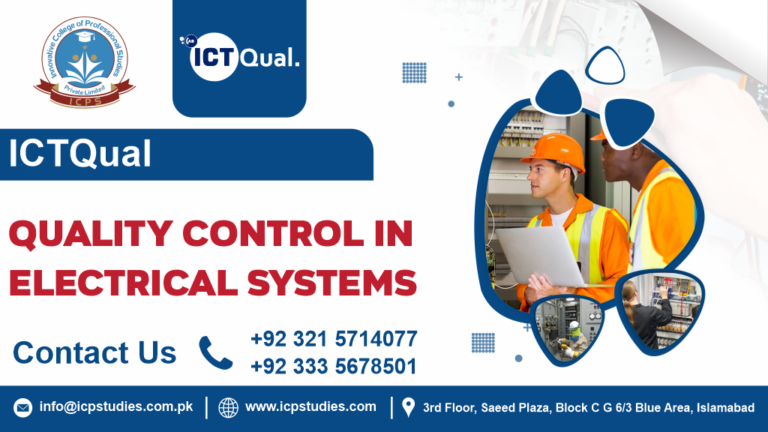In an era where environmental sustainability is a critical focus for organizations worldwide, the ISO 14001:2015 standard for Environmental Management Systems (EMS) plays a pivotal role. This standard helps organizations minimize their environmental impact, comply with regulations, and enhance their sustainability performance. Central to the effective implementation and maintenance of ISO 14001:2015 is the role of the ISO 14001:2015 EMS Lead Auditor.
ISO 14001:2015 is an international standard that specifies the requirements for an effective environmental management system. It provides a framework for organizations to manage their environmental responsibilities, reduce their environmental footprint, and comply with applicable regulations.
The role of an ISO 14001:2015 EMS Lead Auditor is integral to ensuring that organizations effectively manage their environmental impacts and comply with international standards. By leading audits, assessing compliance, and promoting continuous improvement, Lead Auditors play a key role in advancing environmental sustainability and operational excellence.
All About ISO 14001:2015 EMS(Environmental Management System) Lead Auditor
Course Overview
An ISO 14001:2015 EMS (Environmental Management System) Lead Auditor is a specialized professional responsible for conducting comprehensive audits of an organization’s environmental management system to ensure compliance with the ISO 14001:2015 standard. This role is critical for verifying that organizations effectively manage their environmental impacts, adhere to regulatory requirements, and continually improve their environmental performance.
ISO 14001:2015 EMS Lead Auditor is vital for evaluating and enhancing an organization’s environmental management system. Through leading audits, assessing compliance, and promoting continuous improvement, Lead Auditors play a key role in helping organizations achieve and maintain high standards of environmental management.
Study Units
- Introduction to Environmental Management Systems (EMS)
- ISO 14001:2015 Requirements
- Environmental Aspects and Impacts Assessment
- Legal and Regulatory Compliance
- Audit Principles and Techniques
- Audit Process and Methodology
- Audit Documentation and Reporting
- Corrective Action and Continuous Improvement
To enroll in the ISO 14001:2015 EMS (Environmental Management System) Lead Auditor course, participants typically need to meet the following requirements:
- Age Requirement: Participants should be at least 18 years old.
- Basic Literacy: A good understanding of English is essential, as course materials and instruction are primarily in English.
- Professional Background: Familiarity with environmental management systems or relevant experience in environmental practices is beneficial.
- Prior Knowledge: Participants should have a basic understanding of ISO 14001:2015 standards and general auditing principles.
- Course Registration: Participants must register for the course through an authorized training provider.
- Payment: Course fees must be paid as required by the training provider.
- Commitment to Attend: Participants should be prepared to attend the full duration of the course to receive certification.
The ISO 14001:2015 EMS (Environmental Management System) Lead Auditor course is designed for:
- Environmental Management Professionals: Individuals responsible for implementing and managing environmental management systems.
- Lead Auditors: Those who conduct audits of environmental management systems and need to understand ISO 14001 standards in depth.
- Quality Managers: Professionals looking to integrate environmental management into their quality management practices.
- Compliance Officers: Individuals tasked with ensuring regulatory compliance related to environmental practices.
- Safety and Health Officers: Professionals involved in occupational health and safety who want to enhance their understanding of environmental impacts.
- Consultants: Those providing advisory services on environmental management and sustainability practices.
- Anyone Seeking ISO 14001 Certification: Individuals aiming to deepen their knowledge of environmental management systems for career advancement.
This course equips participants with the skills and knowledge needed to effectively audit and assess environmental management systems according to ISO 14001:2015 standards, promoting sustainability and compliance.
Learning Outcome
1. Introduction to Environmental Management Systems (EMS)
- Understand EMS Fundamentals: Explain the purpose and benefits of Environmental Management Systems and their role in managing environmental impacts and promoting sustainability.
- Identify Key Components: Describe the core elements of an EMS, including environmental policy, objectives, planning, implementation, monitoring, and review.
- Contextualize EMS: Discuss how EMS integrates with organizational strategy and operational processes to improve environmental performance.
2. ISO 14001:2015 Requirements
- Interpret Standard Requirements: Detail the requirements of the ISO 14001:2015 standard, including the structure and key clauses of the standard.
- Apply ISO 14001:2015: Illustrate how to apply ISO 14001:2015 requirements to develop, implement, and maintain an effective EMS.
- Assess Compliance: Evaluate an organization’s compliance with ISO 14001:2015 and identify areas of alignment or deviation.
3. Environmental Aspects and Impacts Assessment
- Identify Environmental Aspects: Understand how to identify and evaluate environmental aspects of organizational activities, products, and services.
- Assess Impacts: Analyze the environmental impacts associated with identified aspects and determine their significance.
- Manage Risks: Develop strategies to manage and mitigate significant environmental impacts through effective EMS planning and controls.
4. Legal and Regulatory Compliance
- Understand Legal Requirements: Identify applicable environmental laws, regulations, and other compliance obligations relevant to the organization’s operations.
- Ensure Compliance: Develop procedures to ensure ongoing compliance with environmental regulations and integrate legal requirements into the EMS.
- Monitor and Review: Implement mechanisms to monitor compliance, conduct periodic reviews, and address any legal or regulatory changes.
5. Audit Principles and Techniques
- Learn Auditing Principles: Understand the fundamental principles of auditing, including objectivity, evidence-based evaluation, and impartiality.
- Apply Audit Techniques: Use various auditing techniques such as sampling, interviewing, and observation to assess compliance with EMS requirements.
- Evaluate Effectiveness: Demonstrate the ability to assess the effectiveness of the EMS and identify areas for improvement through effective auditing techniques.
6. Audit Process and Methodology
- Plan and Prepare: Develop comprehensive audit plans, including defining audit scope, objectives, criteria, and preparing checklists.
- Conduct the Audit: Execute the audit by following a systematic approach, conducting interviews, and reviewing documentation to evaluate EMS performance.
- Follow Protocols: Adhere to established auditing protocols and methodologies to ensure thoroughness and consistency throughout the audit process.
7. Audit Documentation and Reporting
- Document Findings: Accurately document audit findings, including evidence, non-conformities, and areas of improvement.
- Prepare Reports: Create detailed and clear audit reports that summarize findings, provide recommendations, and offer insights for management decision-making.
- Communicate Results: Effectively communicate audit results to stakeholders, ensuring clarity and actionable feedback.
8. Corrective Action and Continuous Improvement
- Identify Non-Conformities: Recognize and document non-conformities or deviations from ISO 14001:2015 requirements during audits.
- Develop Corrective Actions: Propose and develop corrective actions to address identified issues and prevent recurrence.
- Promote Improvement: Support the implementation of continuous improvement initiatives within the EMS, driving enhancements in environmental performance and sustainability.
These learning outcomes are designed to provide participants with a comprehensive understanding of environmental management systems, the ISO 14001:2015 standard, and the auditing process. By mastering these areas, participants will be well-equipped to lead audits, assess compliance, and contribute to the continuous improvement of environmental management practices.
FAQs about ISO 14001:2015 EMS(Environmental Management System) Lead Auditor







